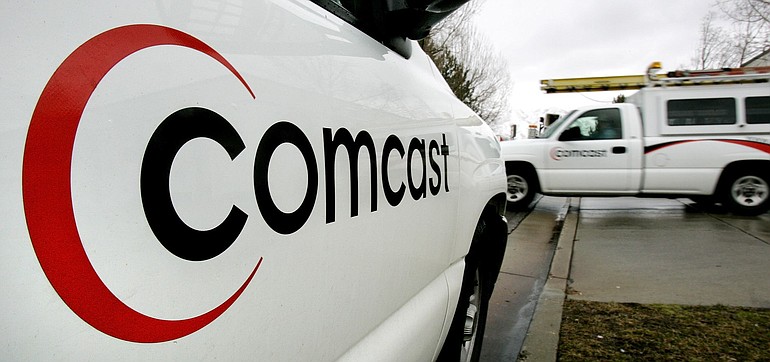It’s not often that Vancouver and Clark County conduct a top-to-bottom review of their contracts with Comcast, the franchised cable television provider for the city and much of the county. But the time for review has arrived, and the two governments have just kicked off a months-long look at Comcast’s service quality, public service programming and plans for the future.
Comcast has held the cable television franchise in Vancouver and Clark County since 2003. Here are its monthly cable television rates during that period. Local governments cannot regulate rates.
YEAR BASIC EXPANDED BASIC
2003 $12.25 $26.79
2004 $12.25 $29.30
2005 $12.25 $31.79
2006 $13 $34.16
2007 $13.72 $37.17
2008 $12.58 $41.82
2009 $12.58 $57.99*
2010 $13.77 $59.95
2011 $15.07 $62.99
*As of April 2009, this service is called Digital Starter Package.
On the Web
Information about the Vancouver and Clark County review of Comcast’s franchise is online at http://www.cityofvancouver.us/cablefranchise.
The city and county both want to write new contracts to replace the existing 15-year franchise agreements now held by Comcast, which expire at the end of 2012. If all goes well, as local government regulators anticipate, the process could be wrapped up a year early. The new contracts could run anywhere from five to 15 years.
Comcast has held the cable television franchise in Vancouver and Clark County since 2003. Here are its monthly cable television rates during that period. Local governments cannot regulate rates.
YEAR BASIC EXPANDED BASIC
2003 $12.25 $26.79
2004 $12.25 $29.30
2005 $12.25 $31.79
2006 $13 $34.16
2007 $13.72 $37.17
2008 $12.58 $41.82
2009 $12.58 $57.99*
2010 $13.77 $59.95
2011 $15.07 $62.99
*As of April 2009, this service is called Digital Starter Package.
On the Web
Information about the Vancouver and Clark County review of Comcast's franchise is online at http://www.cityofvancouver.us/cablefranchise.
The City/County Telecommunications Commission, which advises the Vancouver City Council and the Clark County Board of Commissioners, has developed a public outreach plan running through October. The commission and its staff will evaluate issues about the existing franchise agreement, and use public comments to negotiate a deal that they hope will provide the greatest public benefit from the cable franchise.
“What we want to hear from the public is what they would like to see from the cable system, keeping in mind the limited say local government has over it,” said Fred Bateman, the commission’s chairman.
By limited, Bateman means that government can’t regulate fees charged by Comcast, which have risen steadily for basic cable and have more than doubled for “expanded basic” service since Comcast acquired the franchise from another provider in 2003. Court rulings have stripped local governments of the ability to set cable rates, said Jim Demmon, the commission’s cable television manager. And although local governments can require cable companies to provide local access programming, a 1984 law prohibits those governments from making the companies pay the operating costs of those stations.
The cable commission’s review begins this month with a random telephone survey, now underway, of 400 cable subscribers and 400 non-subscribers. On Friday, it launched a website (http://www.cityofvancouver.us/cablefranchise) to inform citizens about the process. In early May, the commission will initiate an Internet survey based on comments from the phone survey. Also in May, it will organize focus group discussions and meetings with key community leaders.
In August, the commission will consider a draft franchise agreement and hold a work session with Vancouver city councilors and county commissioners. Then it’s time for formal hearings and adoption of city and county franchise agreements in mid-October, Demmon said.
Comcast has more than 83,000 cable television customers in Clark County, and the company offers many non-regulated services including telephone and Internet access. Last year, the cable commission received just 117 customer complaints against Comcast related to cable service, Demmon said. The company met or exceeded the franchise requirement of responding to 90 percent of phone calls within 30 seconds, he said.
The company pays a franchise fee of 5 percent of its gross revenues. That fee generated $1.8 million for the city and $1.6 million for Clark County in 2010. The money goes to city and county general funds, but those governments have each contributed $250,000 annually to help pay for operations of public, education and governmental services stations. Comcast also collects a $1 monthly fee from each customer, generating $780,000 in 2010, which can be spent on capital costs.
The channels required by the franchise agreement include public channel FVTV (channel 11); TV ETC educational channels (channels 27, 28 and 29); and government channels CVTV 21 and 23 and TVW 22.
The franchise also requires Comcast to provide channels offering Washington state news and programming, a key issue to many customers because local commercial stations based in Portland focus on Oregon news and issues. Also, Comcast provides cable access to internal network services of the city of Vancouver, Clark County, the Ft. Vancouver Regional Library District and the Northwest Regional Training Center.
Comcast’s franchise is non-exclusive and any competitor could set up shop in the city or county. Its main competitive threat comes not from other cable companies, but from satellite dish networks and other non-cable delivery systems. Theressa Davis, Comcast’s vice-president of external affairs in Portland, said the company has long had a very positive relationship with Vancouver and Clark County. She said the company’s key issue is in remaining competitive with unregulated providers.
“We really look for a fair balance between the regulatory environment and business needs, so we can compete on a level playing field,” she said.




